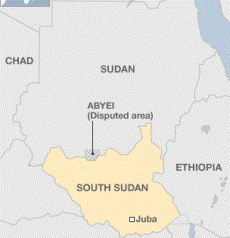Inclusion of Heglig in South Sudan’s new map unsupported by evidence, Khartoum says
May 14, 2012 (KHARTOUM) – South Sudan’s decision to include disputed border regions such as Heglig in its new map is lacking in evidence, a Sudanese official argued on Sunday.
 Earlier this month, the newly independent Republic of South Sudan revealed its new official map which incorporated territories whose ownership is also claimed by neighboring Sudan.
Earlier this month, the newly independent Republic of South Sudan revealed its new official map which incorporated territories whose ownership is also claimed by neighboring Sudan.
Juba says that those areas, which include Heglig oilfields, the site of recent fighting between Sudan and South Sudan, and Abyei, another hotly contested region, were illegally annexed to Sudanese territories by successive governments in Khartoum.
South Sudan briefly occupied Heglig last month but later withdrew forces due to what appears to be a mix of foreign diplomatic pressure and attacks by the Sudanese army.
According to the Sudanese chairman of the joint border-demarcation committee with South Sudan, Abd-Allah Al-Sadiq, Juba’s inclusion of those areas is “erroneous” and has no proof in existing documents.
He told reporters in Khartoum that the borders between the two countries are the ones that stood when Sudan gained independence in 1956.
Al-Sadiq pointed out that there are only four areas of contention in borderlands, identifying the first as Dabat Al-Fakhar area south of Goda town in White Nile State.
The second, he said, is the area extending from Al-Muquinis Mountain to the White Nile and Kaka trade area in South Kordofan.
He added that the others include Hofrat Al-Nuhas, Kafi Kingi and Kafan Dabi in South Darfur State.
Al-Sadiq asserted that Sudan is in possession of documents and evidences confirming its ownership of these areas in terms of geography and population.
Demarcation of borders is among a host of contentious issues Khartoum and Juba have been negotiating with little success since South Sudan seceded from Sudan to form an independent state in July last year.
Sudanese officials previously said that 80 percent of the borders had been agreed but South Sudan’s Vice-President Reck Machar this week dismissed the claim, saying that the two countries contest 60 percent of the borderline.
(ST)
